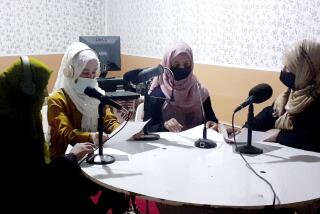Ham Radio Operators Linked Bosnia to Outside World : Balkans: Husband-and-wife team brought news, both joyous and tragic, to separated families. But now authorities have cut them off.
- Share via
BELGRADE, Yugoslavia — With Bosnia-Herzegovina cut off from telephones, telegrams, cards, letters and packages, Dragan and Ljiljana Dimitrijevic tried to provide a crucial information lifeline.
For months, the husband-and-wife team sent out and received thousands of messages via their ham radio, providing a link for separated families and friends to receive critical news--joyous and tragic--about each other.
But now, as with dozens of their Good Samaritan broadcast colleagues, the Dimitrijevics’ services have been cut off by Yugoslav authorities. The government here this spring issued and since has enforced restrictions barring the 150 or so local ham radio operators from transmitting messages from Serbia and Montenegro, the two former republics that make up the rump nation of Yugoslavia.
Some radio contacts are still permitted, but not for purposes of passing on messages to and from those who live in Bosnia.
A report released last month by the Humanitarian Law Fund, a Serbian human rights watchdog, condemned the ban, labeling the Yugoslav Defense Ministry’s decision to limit the work of radio amateurs illegal.
Neither human rights advocates nor ham operators can explain why the government cracked down on the broadcasts; speculation of the motive ranges from fear of espionage to outright cruelty.
“The army thinks that radio amateurs send coded messages,” said Dragan Dimitrijevic, 53, of the espionage theory. “But there are 1,000 other ways if someone wants to transmit ciphers.”
Milos Vasic, an editor of the independent Belgrade newsmagazine Vreme, dismisses the authorities’ theory that ham radio operators have transmitted military secrets. He says the ban on their activities came because “the authorities want to forbid human contact.”
Ljiljana Dimitrijevic says she is angry that their humanitarian efforts should be forbidden.
Until the government cracked down recently, she and her husband received phone calls from people all around the world anxious to garner any scrap of information about friends or relatives in Bosnia.
“If I hooked up someone in Bosnia with just one person in Germany, then I would get five calls,” she said. “Our home was like an international telephone exchange.”
For up to 15 hours each day, the couple would contact ham counterparts in Bosnia, who would, in turn, establish a radio-to-telephone hookup so that long-separated people could speak with each other.
Each day the messages from the outside world poured in: “Are you still alive?” “Can you get out?” “What do you need?”
And from war-torn Bosnia in reply: “Send food.” “Amra had a baby.” “Enes is dead.”
The first step to restrict such communications was taken by the Muslim-led Bosnian government. It banned direct telephone contacts, insisting that ham operators pass on messages rather than allow a third party to speak directly over the radio. Serbian authorities retaliated by outlawing the transmission of all messages, except for those handled by a handful of radio stations, such as the Jewish Community Center in Belgrade.
Often, ham radio operators have been the only link between the world and a besieged community.
“Many times I spoke with radio amateurs while their towns were being bombed,” says Ljiljana Dimitrijevic.
A ham radio devotee for 38 years, Ljiljana even met her husband over the radio waves. Numerous radio awards decorate the “control room” in their fourth-floor apartment. But when the more than 2-year-old war began, their onetime hobby became something of a crusade to foster human contacts throughout the war-torn former federation.
Ljiljana Dimitrijevic says the work has sometimes been painful.
“What can you say when a young ham radio operator tells a weeping father to pull himself together so that he could speak to his son, who was on the other side?” she asks.
But the crackling airwaves sometimes have carried laughter too.
“One woman had not seen her husband in two years,” she recounted. “Finally, we established a telephone contact, but his voice, relayed through several links, was so distorted that she insisted that it was not her husband. When he started to curse, she laughed and said, ‘So it really is you!’ ”
The Dimitrijevics say they have maintained strict neutrality in their work.
“We never discussed politics or even wondered about the nationality of the person on the other end,” Dragan Dimitrijevic says.
While the Dimitrijevics have not yet managed to collect the multitude of documents that the government demands to re-register their station, they have escaped any trouble. They are even allowed to establish direct radio contacts so long as they take care to avoid saying anything that could be construed as a third-party message.
More to Read
Sign up for Essential California
The most important California stories and recommendations in your inbox every morning.
You may occasionally receive promotional content from the Los Angeles Times.













